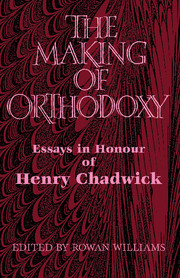Book contents
- Frontmatter
- Contents
- Preface
- List of abbreviations
- Bibliography of Henry Chadwick
- Does it make sense to speak of pre-Nicene orthodoxy?
- ‘And I have other sheep’ – John 10:16
- Reason and the rule of faith in the second century ad
- Adam in Origen
- Panegyric, history and hagiography in Eusebius' Life of Constantine
- Matthew 28:19, Eusebius, and the lex orandi
- The achievement of orthodoxy in the fourth century ad
- Eunomius: hair-splitting dialectician or defender of the accessibility of salvation?
- Some sources used in the De Trinitate ascribed to Didymus the Blind
- The rhetorical schools and their influence on patristic exegesis
- Pelagianism in the East
- The legacy of Pelagius: orthodoxy, heresy and conciliation
- Augustine and millenarianism
- Divine simplicity as a problem for orthodoxy
- The origins of monasticism
- Artistic idiom and doctrinal development
- Index of modern names
- Index of ancient and medieval names
- Index of sources
Matthew 28:19, Eusebius, and the lex orandi
Published online by Cambridge University Press: 08 October 2009
- Frontmatter
- Contents
- Preface
- List of abbreviations
- Bibliography of Henry Chadwick
- Does it make sense to speak of pre-Nicene orthodoxy?
- ‘And I have other sheep’ – John 10:16
- Reason and the rule of faith in the second century ad
- Adam in Origen
- Panegyric, history and hagiography in Eusebius' Life of Constantine
- Matthew 28:19, Eusebius, and the lex orandi
- The achievement of orthodoxy in the fourth century ad
- Eunomius: hair-splitting dialectician or defender of the accessibility of salvation?
- Some sources used in the De Trinitate ascribed to Didymus the Blind
- The rhetorical schools and their influence on patristic exegesis
- Pelagianism in the East
- The legacy of Pelagius: orthodoxy, heresy and conciliation
- Augustine and millenarianism
- Divine simplicity as a problem for orthodoxy
- The origins of monasticism
- Artistic idiom and doctrinal development
- Index of modern names
- Index of ancient and medieval names
- Index of sources
Summary
La formule du baptême s'est enlargie et comprend sous une forme assez synthétique les trois mots sacramentales de la théologie du temps, le Père, le Fils, le Saint-Ésprit. Le germe du dogme de la Trinité est ainsi déposé dans un coin de la page sacrée, et deviendra fecond.
Renan's comment on Matthew 28.19 revealed an insight into the part played by the lex orandi in the creation of this text, as well as by the text itself in the evolution of the lex credendi, that was well ahead of its time, and still remained so when F. C. Conybeare, a quarter of a century later, proposed to advance on it in two respects. Renan had nowhere implied that the hand that planted the seed of Trinitarian dogma in the gospel, whatever its cultic background, was any but the evangelist's own; Conybeare found evidence in Eusebius' writings that suggested otherwise. And the extreme conclusions that he drew from that evidence about Eusebius' permanent ignorance of the received text were pressed into the service of an account of later dogmatic history that was not evolutionary so much as revolutionary.
Iconoclasm invites overkill, and it was to be expected that conservative professionals like E. Riggenbach and J. Lebreton (who would have been little happier with Renan's position than with Conybeare's) would apply themselves to crush the gentleman amateur on both counts. Of his wilder conclusions they were able to make short work.
- Type
- Chapter
- Information
- The Making of OrthodoxyEssays in Honour of Henry Chadwick, pp. 124 - 141Publisher: Cambridge University PressPrint publication year: 1989
- 1
- Cited by



